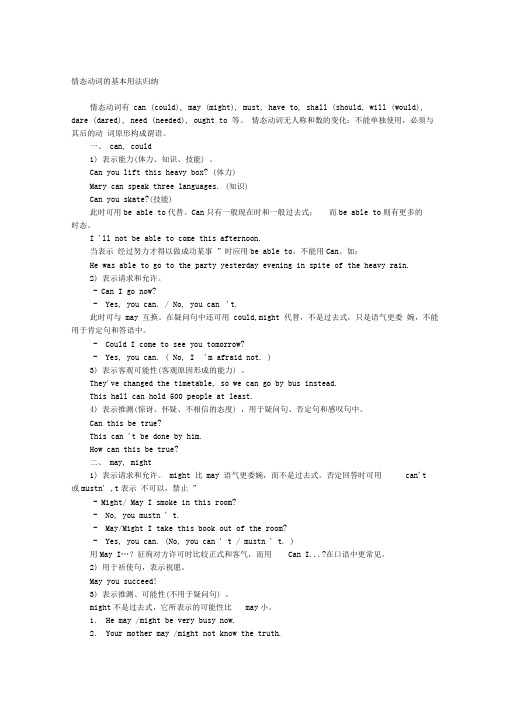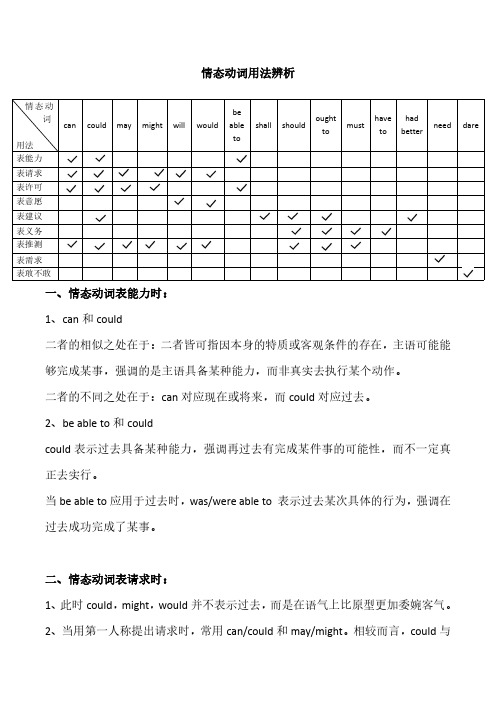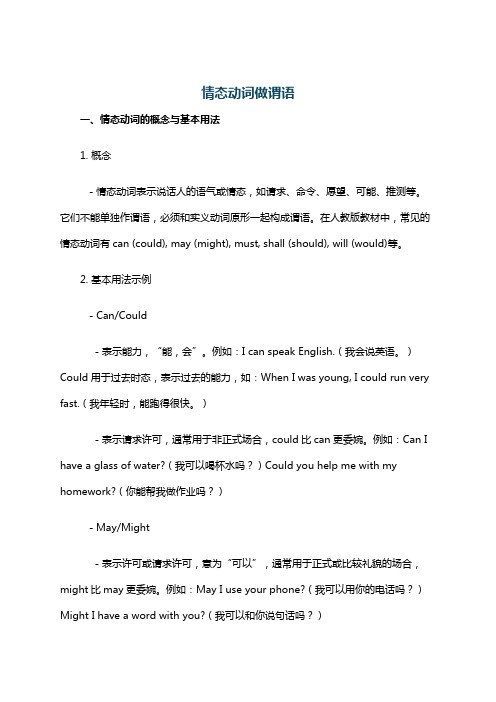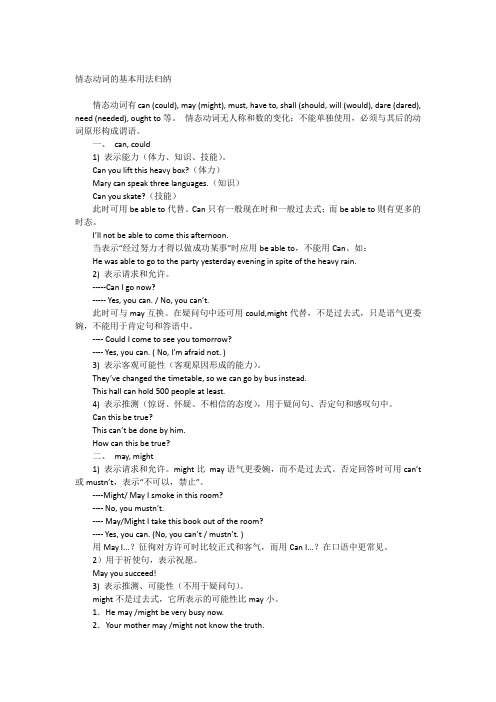情态动词can, could will与would的用法和区别
(完整版)情态动词的基本用法归纳

情态动词的基本用法归纳情态动词有can (could), may (might), must, have to, shall (should, will (would), dare (dared), need (needed), ought to 等。
情态动词无人称和数的变化;不能单独使用,必须与其后的动词原形构成谓语。
一、can, could1)表示能力(体力、知识、技能) 。
Can you lift this heavy box? (体力)Mary can speak three languages. (知识)Can you skate?(技能)此时可用be able to代替。
Can只有一般现在时和一般过去式;而be able to则有更多的时态。
I 'll not be able to come this afternoon.当表示经过努力才得以做成功某事”时应用be able to,不能用Can。
如:He was able to go to the party yesterday evening in spite of the heavy rain.2)表示请求和允许。
- Can I go now?- Yes, you can. / No, you can 't.此时可与may 互换。
在疑问句中还可用could,might 代替,不是过去式,只是语气更委婉,不能用于肯定句和答语中。
- Could I come to see you tomorrow?- Yes, you can. ( No, I 'm afraid not. )3)表示客观可能性(客观原因形成的能力) 。
They've changed the timetable, so we can go by bus instead.This hall can hold 500 people at least.4)表示推测(惊讶、怀疑、不相信的态度) ,用于疑问句、否定句和感叹句中。
情态动词用法归纳总结

情态动词用法辨析情态动词用法can could may might will would be able to shall should ought to must have to had better need dare表能力表请求表许可表意愿表建议表义务表推测表需求表敢不敢一、情态动词表能力时:1、can 和could二者的相似之处在于:二者皆可指因本身的特质或客观条件的存在,主语可能能够完成某事,强调的是主语具备某种能力,而非真实去执行某个动作。
二者的不同之处在于:can 对应现在或将来,而could 对应过去。
2、be able to 和couldcould 表示过去具备某种能力,强调再过去有完成某件事的可能性,而不一定真正去实行。
当be able to 应用于过去时,was/were able to 表示过去某次具体的行为,强调在过去成功完成了某事。
二、情态动词表请求时:1、此时could ,might ,would 并不表示过去,而是在语气上比原型更加委婉客气。
2、当用第一人称提出请求时,常用can/could 和may/might 。
相较而言,could 与may在表请求的问句中出现的频率最高;might表发请求的语气最为委婉客气,因此反而很少见;而can则常用于熟人间的对话中。
语气强度:can>could/might>might3、当用第二人称提出请求时,常用can/could和will/would。
其中could和would 表达请求的语气更委婉客气;而can与will则常用于熟人对话中。
语气强度:can/will>could/would三、情态动词表许可时:1、与表请求不同,will/would不论前接第几人称,都表示主语本身的意愿,无需得到他人的“许可”,所以will/would不可以用于表请求的句中。
2、can和may二者都可以表示对现在或将来动作的许可,其中can的使用频率更高。
情态动词做谓语

情态动词做谓语一、情态动词的概念与基本用法1. 概念- 情态动词表示说话人的语气或情态,如请求、命令、愿望、可能、推测等。
它们不能单独作谓语,必须和实义动词原形一起构成谓语。
在人教版教材中,常见的情态动词有can (could), may (might), must, shall (should), will (would)等。
2. 基本用法示例- Can/Could- 表示能力,“能,会”。
例如:I can speak English.(我会说英语。
)Could用于过去时态,表示过去的能力,如:When I was young, I could run very fast.(我年轻时,能跑得很快。
)- 表示请求许可,通常用于非正式场合,could比can更委婉。
例如:Can I have a glass of water?(我可以喝杯水吗?)Could you help me with my homework?(你能帮我做作业吗?)- May/Might- 表示许可或请求许可,意为“可以”,通常用于正式或比较礼貌的场合,might比may更委婉。
例如:May I use your phone?(我可以用你的电话吗?)Might I have a word with you?(我可以和你说句话吗?)- 表示可能性,“也许,可能”。
例如:It may rain tomorrow.(明天可能会下雨。
)- Must- 表示必要性或义务,“必须,应该”。
例如:You must wear a seatbelt in the car.(你在汽车里必须系安全带。
)- 表示推测时,用于肯定句,意为“一定,准是”,它表达的是高度的可能性。
例如:He must be at home because his car is in the driveway.(他一定在家,因为他的车在车道上。
)- Shall/Should- Shall用于第一人称,表示征求意见或提出建议,常用于疑问句。
情态动词的基本用法归纳

情态动词的基本用法归纳情态动词有can (could), may (might), must, have to, shall (should, will (would), dare (dared), need (needed), ought to等。
情态动词无人称和数的变化;不能单独使用,必须与其后的动词原形构成谓语。
一、can, could1) 表示能力(体力、知识、技能)。
Can you lift this heavy box?(体力)Mary can speak three languages.(知识)Can you skate?(技能)此时可用be able to代替。
Can只有一般现在时和一般过去式;而be able to则有更多的时态。
I’ll not be able to come this afternoon.当表示“经过努力才得以做成功某事”时应用be able to,不能用Can。
如:He was able to go to the party yesterday evening in spite of the heavy rain.2) 表示请求和允许。
-----Can I go now?----- Yes, you can. / No, you can’t.此时可与may互换。
在疑问句中还可用could,might代替,不是过去式,只是语气更委婉,不能用于肯定句和答语中。
---- Could I come to see you tomorrow?---- Yes, you can. ( No, I’m afraid not. )3) 表示客观可能性(客观原因形成的能力)。
T hey’ve changed the timetable, so we can go by bus instead.This hall can hold 500 people at least.4) 表示推测(惊讶、怀疑、不相信的态度),用于疑问句、否定句和感叹句中。
情态动词的用法整理归纳

情态动词的用法整理归纳为了做好高中英语的备考复习,下面由小编为你精心准备了“情态动词的用法整理归纳",持续关注本站将可以持续获取更多的考试资讯!情态动词的用法整理归纳情态动词有can (could), may (might), must, have to,shall (should,will (would),dare (dared),need (needed), ought to等。
情态动词无人称和数的变化;不能单独使用,必须与其后的动词原形构成谓语。
一、 can, could1)表示能力(体力、知识、技能)。
Can you lift this heavy box?(体力)Mary can speak three languages.(知识)Can you skate?(技能)此时可用be able to代替。
Can只有一般现在时和一般过去式;而be able to则有更多的时态。
I’ll not be able to come this afternoon.当表示“经过努力才得以做成功某事”时应用be able to,不能用Can。
如:He was able to go to the party yesterday evening in spite of the heavy rain.2)表示请求和允许。
-----Can I go now?----- Yes, you can. / No,you can’t.此时可与may互换。
在疑问句中还可用could,might代替,不是过去式,只是语气更委婉,不能用于肯定句和答语中。
---- Could I come to see you tomorrow?---- Yes, you can. ( No,I’m afraid not. )3)表示客观可能性(客观原因形成的能力)。
They’ve changed the timetable,so we can go by bus instead.This hall can hold 500 people at least.4)表示推测(惊讶、怀疑、不相信的态度),用于疑问句、否定句和感叹句中。
语法中的情态动词与情态动词的疑问与否定形式

语法中的情态动词与情态动词的疑问与否定形式情态动词是英语语法中的一类特殊动词,用于表达说话人的态度、推测、义务、建议等意义。
常见的情态动词有can、could、may、might、shall、should、will、would、must、ought to等。
情态动词具有一些特殊的用法和构成疑问句、否定句的规则。
本文将详细介绍情态动词的用法以及其疑问与否定形式。
一、情态动词的用法情态动词在句子中具有一些特殊的用法和意义,下面是一些常见的用法:1. 表示能力和许可:can、could、may、might- Can I go to the bathroom?(我可以去洗手间吗?)- You could have a piece of cake if you want.(如果你想要的话,可以吃一块蛋糕。
)- May I borrow your pen?(我可以借用你的钢笔吗?)- He might be able to finish the project on time.(他也许能够按时完成这个项目。
)2. 表示推测和可能性:may、might、could- He may be late for the meeting.(他也许会迟到开会。
)- It might rain tomorrow.(明天可能会下雨。
)- Could you be mistaken?(你可能错了吗?)3. 表示义务和建议:shall、should、must、ought to- You shall not steal.(你不可以偷。
)- You should study harder.(你应该更努力学习。
)- We must finish the project before the deadline.(我们必须在截止日期之前完成这个项目。
)- You ought to apologize to her.(你应该向她道歉。
)二、情态动词的疑问形式情态动词在构成疑问句时,常常与主语调换位置。
情态动词的用法区别学会区分情态动词的不同用法

情态动词的用法区别学会区分情态动词的不同用法情态动词的用法区别情态动词是一类特殊的动词,用来表示说话人对某种动作或状态的态度、愿望、能力或推测等情态,在句子中起到限制、修饰其他动词或表达说话人的意愿的作用。
在英语中,常见的情态动词包括can、could、may、might、shall、should、will、would、must等。
理解和正确运用情态动词,对于学习英语的学生来说非常重要。
本文将从情态动词的用法区别展开讨论,帮助读者更好地掌握这一语法知识。
一、表示能力和许可的区别1. can与could的区别can和could都表示能力,但在用法上有一些区别。
can用于一般现在时,表示现在或将来的某种能力,而could则用于一般过去时,表示过去的能力。
例如:He can speak English fluently.(他能说流利的英语。
)He could swim when he was young.(他小时候会游泳。
)此外,could还可用于表示一种委婉的请求或许可。
例如:Could you please pass me the salt?(请你把盐递给我好吗?)2. may与might的区别may与might都表示许可,但may更常用于正式场合,might更常用于非正式场合,且might更加委婉。
例如:May I use your computer?(我可以用你的电脑吗?)Might I borrow your pen? (我能借你的笔用一下吗?)二、表示推测和可能性的区别1. must与may的区别must和may都用于表示推测和可能性,但语气上有一定的差异。
must表示说话人的推测非常肯定,有把握,而may则表示说话人的推测不那么肯定。
例如:She must be tired because she worked all day.(她一定很累,因为整天都在工作。
)She may be tired because she worked all day.(她可能很累,因为整天都在工作。
情态动词的基本用法归纳

情态动词的基本用法归纳情态动词有can (could),may (might), must, have to,shall (should,will (would),dare (dared), need (needed),ought to等. 情态动词无人称和数的变化;不能单独使用,必须与其后的动词原形构成谓语.一、can,could1)表示能力(体力、知识、技能)。
Can you lift this heavy box?(体力)Mary can speak three languages.(知识)Can you skate?(技能)此时可用be able to代替.Can只有一般现在时和一般过去式;而be able to则有更多的时态。
I’ll not be able to come this afternoon。
当表示“经过努力才得以做成功某事"时应用be able to,不能用Can。
如:He was able to go to the party yesterday evening in spite of the heavy rain。
2) 表示请求和允许.-————Can I go now?--——— Yes,you can。
/ No, you can’t.此时可与may互换。
在疑问句中还可用could,might代替,不是过去式,只是语气更委婉,不能用于肯定句和答语中.-——— Could I come to see you tomorrow?—-—- Yes, you can。
( No, I’m afraid not。
)3)表示客观可能性(客观原因形成的能力)。
T hey’ve changed the timetable, so we can go by bus instead.This hall can hold 500 people at least.4)表示推测(惊讶、怀疑、不相信的态度),用于疑问句、否定句和感叹句中.Can this be true?This can’t be done by him.How can this be true?二、may, might1)表示请求和允许。
- 1、下载文档前请自行甄别文档内容的完整性,平台不提供额外的编辑、内容补充、找答案等附加服务。
- 2、"仅部分预览"的文档,不可在线预览部分如存在完整性等问题,可反馈申请退款(可完整预览的文档不适用该条件!)。
- 3、如文档侵犯您的权益,请联系客服反馈,我们会尽快为您处理(人工客服工作时间:9:00-18:30)。
情态动词can, could will与would的用法和区别
一、情态动词can的用法
1. 表示能力,意思是:能,会。
如:
I can't swim. 我不会游泳。
Can you drive?你会开车吗?
2. 表示客观可能性,意思是:可以,可能。
如:
That big cinema can seats 2,000 people. 那家大电影院能坐2000人。
He can be very friendly at times. 有时他会很友好。
3. 表示允许(和may意思相近),意思是:可以,能够。
如:
You can have the book when I have finished it. 书我看完了可以给你。
Can I use your pen?我可以用你的钢笔吗?
4. 表示惊异、不相信等(用于疑问句、否定句或感叹句中),意思是:会,可能。
如:
This can't be true. 这不可能是真的。
Can it be true?这可能是真的吗?
二、情态动词could的用法
1. 表示“能力”或“可能性”,作为can的过去形式。
如:
Could you speak English then?那时你能讲英语吗?
He said he couldn't follow me. 他说他跟不上我。
2. 表示惊异、怀疑、不相信等情绪。
如:
Who could have taken them?谁会把它们拿走了呢?
She couldn't have left so soon. 她不可能这么快就走了。
在这种情况下,could和can是可以换用的,用could时口气较缓和,用can时不相信的程度更强一些,两者在时间上没有差别。
3. 比较委婉客气地提出问题或陈述看法。
如:
/P>
—Could you let me have your passport?
—Yes, here it is.
—看看你的护照好吗?
—行,这就是。
I could come earlier, if necessary. 如果必要我可以早点来。
这时could和can没有时间上的差别。
4. 在虚拟条件句中构成谓语。
如:
I would certainly do it for you if I could. 要是我能做得到,我一定会为你们做这事儿。
How I wish I could go with you! 我多么希望和你们一道去!
三、can, could和be able to的区别与联系。
1. can的过去式是could,但could 除了可作can的过去式外,还可表比can 更委婉的语气,因此在回答由could 表示请求的问句中,不能用could,但可用can。
如:
—Could you lend me a hand?
—Of course I can.
2. 在表示现在或过去的智力、体力、技能等方面的“能力”时,can, could 常可与be able to互换。
如:
/P>
He could (or was able to) swim five miles when he was a boy.
3. be able to有比can更多的形式,如"will be able to","have (has) been able to" "had been able to" 等等。
因此be able to常被用来表示can所不能表示的将来或完成的概念。
如:
/P>
They will be able to run this machine on their own in three months. 他们过三个月就能自己开这台机器了。
4. 在表示成功地做了某事时,不用could,而用was / were able to (或managed to, succeeded in doing sth )来表示。
如:
He was able to (or managed to) finish the job yesterday。
但是couldn't和wasn't / weren't able to 常可互换。
如:
I couldn't / wasn't able to finish the job yesterday.
5. 与感觉动词连用时,can,could亦可与be able to互换。
如:
We could/were able to smell something burning in the kitchen.
will与would的三点区别
1. 表示意愿时的区别
will 表示现在的意愿,would 表示过去的意愿:
Go where you will. 你愿到哪里就到哪里。
She asked if I would go with them. 她问我是否愿意同他们一起去。
2. 表示征求意见或提出请求的区别
主要用于第二人称的疑问句中,will 和 would 均可用,would 此时并不表示过去,而表示委婉语气:
Won’t you take off your coat? 你要不要把大衣脱掉?
Will [would] you please post the letter for me? 请帮我寄了这封信好吗?
3. 表示习惯和倾向性的区别
will 表示现在的习惯,would 表示过去的习惯:
This window won’t open. 这扇窗户经常打不开。
When he was a child, he would often go skating. 他小时候经常去滑冰。
would like / would love可视为习语,意为“想要”,其后接名词、代词或不定式:
I would like a cup of tea. 我想要杯茶。
We would love to go with him. 我们想同他一起去。
